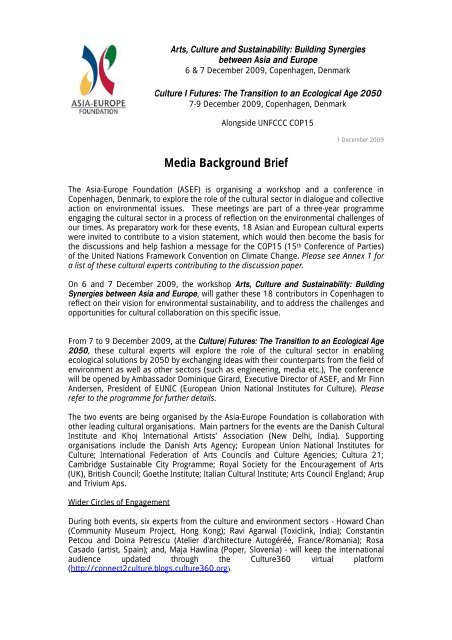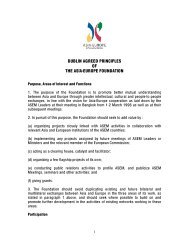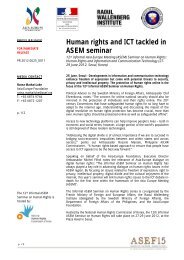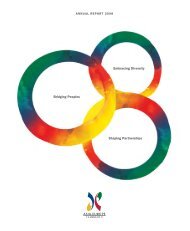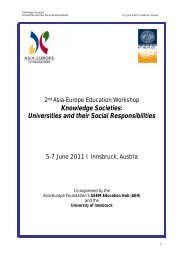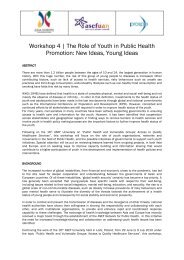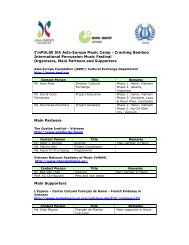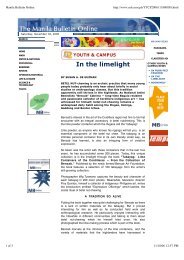Media Background Brief - Asia-Europe Foundation
Media Background Brief - Asia-Europe Foundation
Media Background Brief - Asia-Europe Foundation
Create successful ePaper yourself
Turn your PDF publications into a flip-book with our unique Google optimized e-Paper software.
Arts, Culture and Sustainability: Building Synergies<br />
between <strong>Asia</strong> and <strong>Europe</strong><br />
6 & 7 December 2009, Copenhagen, Denmark<br />
Culture I Futures: The Transition to an Ecological Age 2050<br />
7-9 December 2009, Copenhagen, Denmark<br />
Alongside UNFCCC COP15<br />
<strong>Media</strong> <strong>Background</strong> <strong>Brief</strong><br />
1 December 2009<br />
The <strong>Asia</strong>-<strong>Europe</strong> <strong>Foundation</strong> (ASEF) is organising a workshop and a conference in<br />
Copenhagen, Denmark, to explore the role of the cultural sector in dialogue and collective<br />
action on environmental issues. These meetings are part of a three-year programme<br />
engaging the cultural sector in a process of reflection on the environmental challenges of<br />
our times. As preparatory work for these events, 18 <strong>Asia</strong>n and <strong>Europe</strong>an cultural experts<br />
were invited to contribute to a vision statement, which would then become the basis for<br />
the discussions and help fashion a message for the COP15 (15 th Conference of Parties)<br />
of the United Nations Framework Convention on Climate Change. Please see Annex 1 for<br />
a list of these cultural experts contributing to the discussion paper.<br />
On 6 and 7 December 2009, the workshop Arts, Culture and Sustainability: Building<br />
Synergies between <strong>Asia</strong> and <strong>Europe</strong>, will gather these 18 contributors in Copenhagen to<br />
reflect on their vision for environmental sustainability, and to address the challenges and<br />
opportunities for cultural collaboration on this specific issue.<br />
From 7 to 9 December 2009, at the Culture|Futures: The Transition to an Ecological Age<br />
2050, these cultural experts will explore the role of the cultural sector in enabling<br />
ecological solutions by 2050 by exchanging ideas with their counterparts from the field of<br />
environment as well as other sectors (such as engineering, media etc.), The conference<br />
will be opened by Ambassador Dominique Girard, Executive Director of ASEF, and Mr Finn<br />
Andersen, President of EUNIC (<strong>Europe</strong>an Union National Institutes for Culture). Please<br />
refer to the programme for further details.<br />
The two events are being organised by the <strong>Asia</strong>-<strong>Europe</strong> <strong>Foundation</strong> is collaboration with<br />
other leading cultural organisations. Main partners for the events are the Danish Cultural<br />
Institute and Khoj International Artists’ Association (New Delhi, India). Supporting<br />
organisations include the Danish Arts Agency; <strong>Europe</strong>an Union National Institutes for<br />
Culture; International Federation of Arts Councils and Culture Agencies; Cultura 21;<br />
Cambridge Sustainable City Programme; Royal Society for the Encouragement of Arts<br />
(UK), British Council; Goethe Institute; Italian Cultural Institute; Arts Council England; Arup<br />
and Trivium Aps.<br />
Wider Circles of Engagement<br />
During both events, six experts from the culture and environment sectors - Howard Chan<br />
(Community Museum Project, Hong Kong); Ravi Agarwal (Toxiclink, India); Constantin<br />
Petcou and Doina Petrescu (Atelier d'architecture Autogéréé, France/Romania); Rosa<br />
Casado (artist, Spain); and, Maja Hawlina (Poper, Slovenia) - will keep the international<br />
audience updated through the Culture360 virtual platform<br />
(http://connect2culture.blogs.culture360.org).
Connect2Culture<br />
The workshop and conference are part of ASEF’s Connect2Culture programme - a threeyear<br />
programme that explores the connections between arts, culture and environmental<br />
issues - launched in conjunction with the 7th <strong>Asia</strong>-<strong>Europe</strong> Meeting (ASEM) Summit of<br />
Heads of State and Government (Beijing, 2008). The programme will eventually lead to a<br />
conference and policy inputs in preparation for the 8th ASEM Summit of Heads of State<br />
and Government (Brussels, Oct 2010).<br />
Ms. Katelijn Verstraete, Assistant Director, Cultural Exchange<br />
<strong>Asia</strong>-<strong>Europe</strong> <strong>Foundation</strong> (ASEF) I 31 Heng Mui Keng Terrace, Singapore 119595<br />
Tel: +65 6874 9724 I Fax: +65 6872 1207 I Email: katelijn.verstraete@asef.org<br />
Ms. Soh Lai Yee, Assistant Director, Public Affairs<br />
<strong>Asia</strong>-<strong>Europe</strong> <strong>Foundation</strong> (ASEF) I 31 Heng Mui Keng Terrace I Singapore 119595<br />
Tel: +65 6874 9729 I Fax: +65 6872 1206 I Email: laiyee@asef.org<br />
Main partners of the above-mentioned events:<br />
The <strong>Asia</strong>-<strong>Europe</strong> <strong>Foundation</strong> (ASEF) promotes greater mutual understanding between <strong>Asia</strong><br />
and <strong>Europe</strong> through intellectual, cultural and people-to-people exchanges. Through ASEF, civil<br />
society concerns are included as a vital component of deliberations of the <strong>Asia</strong>-<strong>Europe</strong><br />
Meeting (ASEM).<br />
ASEF was established in February 1997 by the participating governments of ASEM. Since then, ASEF has<br />
implemented over 350 projects, engaging over 15,000 direct participants as well as reaching out to a much<br />
wider audience in <strong>Asia</strong> and <strong>Europe</strong>. www.asef.org<br />
The <strong>Asia</strong>-<strong>Europe</strong> Meeting (ASEM) now brings together 43 member states (Austria, Belgium, Brunei Darussalam, Bulgaria,<br />
Cambodia, China, Cyprus, Czech Republic, Denmark, Estonia, Finland, France, Germany, Greece, Hungary, Indonesia, India,<br />
Ireland, Italy, Japan, Korea, Laos, Latvia, Lithuania, Luxembourg, Malaysia, Malta, Mongolia, Myanmar, the Netherlands,<br />
Pakistan, the Philippines, Poland, Portugal, Romania, Singapore, Slovakia, Slovenia, Spain, Sweden, Thailand, United<br />
Kingdom, Vietnam), the <strong>Europe</strong>an Commission and the ASEAN Secretariat. www.aseminfoboard.org<br />
The Danish Cultural Institute promotes cultural exchanges and<br />
informs about Denmark and supports projects that aim at long-term<br />
cooperation between foreign and Danish cultural institutions, artists<br />
and other professionals. The Danish Cultural Institute is an independent institution, which receives a yearly<br />
government grant through the Danish Ministry of Culture.<br />
http://www.dankultur.dk/<br />
KHOJ International Artists' Association is an artist-led, alternative space for<br />
experimentation and international exchange based in India. Part of the global Triangle<br />
Arts Trust, KHOJ sees its role as an incubator for art and ideas, artistic exchange and<br />
dialogue in the visual arts. Through its programming, KHOJ aims to assist and develop<br />
forms of art such as media art, performance, video, environmental, public and community based art, sound<br />
and other experimental modes of cultural production.<br />
ASEF’s contribution is with the financial support of the <strong>Europe</strong>an Commission. The views expressed herein are<br />
in no way taken to reflect the official opinion or position of the <strong>Europe</strong>an Commission, the <strong>Asia</strong>-<strong>Europe</strong><br />
<strong>Foundation</strong> or ASEF’s partner organisations.<br />
<strong>Asia</strong>-<strong>Europe</strong> <strong>Foundation</strong> Page 2 of 3
Annex 1: Contributors to the Discussion Paper<br />
From <strong>Asia</strong> (in alphabetical order):<br />
1. Yusaku Imamura (Japan)<br />
Director, Tokyo Wonder Site<br />
Counselor on Special Issue to the Governor, Tokyo Metropolitan Government<br />
2. Dr. Singh Intrachooto (Thailand)<br />
Head, Building Innovation and Technology Program, Department of Architecture,<br />
Kasetsart University<br />
3. Marco Kusumawijaya (Indonesia)<br />
Chair and Director of Jakarta Arts Council<br />
4. Ong Keng Sen (Singapore)<br />
Founder and Artistic Director, TheatreWorks<br />
5. Pooja Sood (India)<br />
Artistic Director of Khoj International Artists’ Association<br />
6. Shiv Visvanathan (India)<br />
Professor, Dhirubhai Ambani Institute of Information and Communication Technology<br />
7. Ada Wong (Hong Kong)<br />
Chief Executive, Hong Kong Institute of Contemporary Culture<br />
8. Maria-Rosalie Zerrudo (Philippines)<br />
Creative Director, Enigmata Creative Circle<br />
From <strong>Europe</strong> (in alphabetical order):<br />
9. Trevor Davies (Denmark/UK)<br />
Director, Copenhagen International Theatre (KIT)<br />
10. Mary Ann DeVLieg (Belgium/Italy)<br />
Secretary General, International Network for Contemporary Performing Arts (IETM)<br />
11. Nik Gaffney (Belgium)<br />
Founding member and media and systems researcher, FOAM<br />
12. Guy Gypens (Belgium)<br />
Artistic Director, Kaaitheater<br />
13. Sacha Kagan (Germany)<br />
Research Associate, Leuphana University<br />
14. Tea Makipaa (Finland)<br />
Visual Artist<br />
15. Lidia Makowska (Poland)<br />
Activist and Cultural Scientist<br />
16. Marko Pelihan (Slovenia)<br />
Associate Professor, Interdisciplinary Studies: Art, Science, Technology, Performance,<br />
Digital <strong>Media</strong> and Space Art, University of California, Santa Barbara<br />
17. Dr. Bernd M. Scherer (Germany)<br />
Director, Haus der Kulturen der Welt<br />
18. Rosina Gomez-Baeza Tinturé (Spain)<br />
Director, LABoral Centre for Art and Creative Industries<br />
<strong>Asia</strong>-<strong>Europe</strong> <strong>Foundation</strong> Page 3 of 3


